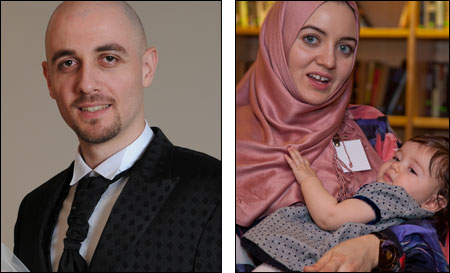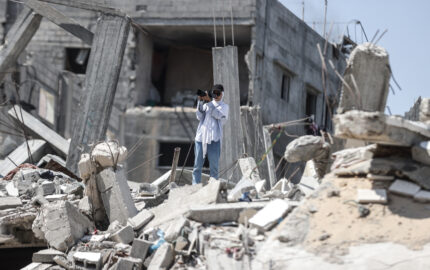
Mohammed Nabbous, honored posthumously; his widow Samra Naas; and their daughter Mayar. Photo by Lisa Abitbol (right).
During the early days of Libya's revolution, Mohammed "Mo" Nabbous was the first in his country to broadcast Muammar el-Qaddafi's attacks on citizen protesters. The 27-year-old jury-rigged a satellite Internet connection and established a makeshift studio in a Benghazi courthouse. He talked to people all over Libya on his mobile phone and filmed attacks by pro-government forces.
It was on February 19, 2011 that Nabbous bypassed the Libyan government's shutdown of the Internet and launched Libya Alhurra TV (Free Libya TV), live-streaming audio and video. One month later he was shot and killed by sniper fire.
At the time, Samra Naas, his wife, was seven months pregnant with their first child. Hours after he died, she announced his passing on the live-stream and asked Libyans to keep working for his cause, the cause of freedom.
Naas traveled to the Nieman Foundation this past December with Mayar, the couple's daughter, to accept an award honoring her husband as a representative of all those who worked to disseminate news during the Arab Spring. Nabbous was selected by the current class of Nieman Fellows as the 2011 recipient of the Louis M. Lyons Award for Conscience and Integrity in Journalism.
In remarks delivered at the ceremony, Naas said her husband risked his life out of love for his country. On the heels of citizen revolts in Egypt and Tunisia, Nabbous felt a sense of urgency. "He believed it was now or never," she said. It was critically important that Libyans—and the rest of the world—know that government forces were using anti-aircraft and heavy artillery against their own citizens, she said.
In joint remarks at the Lyons award ceremony, 2012 Nieman Fellows David Skok and Jonathan Blakley summarized what Nabbous accomplished in the last month of his life. Skok called Nabbous "an anchor, producer, reporter, and a citizen journalist, all wrapped into one. Using the latest tools at his disposal he circumvented the media blackout placed on those inside Libya, setting up the very first independent news channel in a country that hadn't known a free press in over a generation."
In an interview the following day on Public Radio International's "The World," Naas told Lisa Mullins, NF '10, that she plans to raise Mayar in Libya: "Her father died because he believed in Libya and he wanted Libya to become a better place for his kids."



